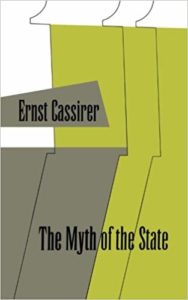Art, Judaism, and the Critique of Fascism in the Work of Ernst Cassirer
by Victoria Kahn
The essay begins:
 The coincidence of the Trump presidency in the United States and the upsurge of rightwing movements in Europe, including Alternativ für Deutschland, make this an appropriate moment for reconsidering Ernst Cassirer’s analysis of fascism in the last chapter of The Myth of the State. Composed in the 1940s, when Cassirer was in the United States, and published posthumously in 1946, The Myth of the State was Cassirer’s last and most explicitly political work. In this work he suggested that the right lens for thinking about authoritarian political movements was myth, not the organic myth of earlier primitive cultures but instead the manufactured myth of late capitalism, which involved the appeal to irrational instincts and the manipulation of symbols. At the same time, Cassirer held on to the possibility of a rational critique of fascism. In our current era of such manufactured myths as “fake news” and “the caravan,” it is worth reflecting on an earlier historical moment when Cassirer confronted the manufactured myths of the Nazi state and offered a defense of rationality missing from much of our current political conversation. In this essay, I explore the basis of Cassirer’s surprising optimism, which I argue has to do not simply with his “symbolic turn,” his critique of neo-Kantianism for its neglect of language and other symbolic systems in shaping human experience, but with his recovery of art as central to the human capacity for critical thinking and his linking of this capacity to the survival of Jewish ethical traditions.
The coincidence of the Trump presidency in the United States and the upsurge of rightwing movements in Europe, including Alternativ für Deutschland, make this an appropriate moment for reconsidering Ernst Cassirer’s analysis of fascism in the last chapter of The Myth of the State. Composed in the 1940s, when Cassirer was in the United States, and published posthumously in 1946, The Myth of the State was Cassirer’s last and most explicitly political work. In this work he suggested that the right lens for thinking about authoritarian political movements was myth, not the organic myth of earlier primitive cultures but instead the manufactured myth of late capitalism, which involved the appeal to irrational instincts and the manipulation of symbols. At the same time, Cassirer held on to the possibility of a rational critique of fascism. In our current era of such manufactured myths as “fake news” and “the caravan,” it is worth reflecting on an earlier historical moment when Cassirer confronted the manufactured myths of the Nazi state and offered a defense of rationality missing from much of our current political conversation. In this essay, I explore the basis of Cassirer’s surprising optimism, which I argue has to do not simply with his “symbolic turn,” his critique of neo-Kantianism for its neglect of language and other symbolic systems in shaping human experience, but with his recovery of art as central to the human capacity for critical thinking and his linking of this capacity to the survival of Jewish ethical traditions.
In an eloquent passage in the last chapter of The Myth of the State, Cassirer spoke to his dawning realization that the technological manipulation of myth could fundamentally transform human nature:
Of all the sad experiences of these last twelve years this is perhaps the most dreadful one. It may be compared to the experience of Odysseus on the island of Circe. But it is even worse. Circe had transformed the friends and companions of Odysseus into various animal shapes. But here are men, men of education and intelligence, honest and upright men who suddenly give up the highest human privilege. They have ceased to be free and personal agents. . . . They act like marionettes in a puppet show—and they do not even know that the strings of this show and of man’s whole individual and social life, are henceforward pulled by the political leaders.
Cassirer went on to argue that “the usual means of political oppression would not have sufficed to produce this effect.” It was technology understood as a series of techniques for producing (and as the new twentieth-century media for amplifying) the myth of the state: the systematic degradation of language, the introduction of new rites, the unifying myth of a master race, and the mythic view of time and history as fate.
Despite the eloquence of the last chapter, the book was not well received. In an early review of The Myth of the State, Eric Voegelin accused Cassirer of subscribing to an idea of historical progress, whereby myth was superseded by rationalism. Only someone who subscribed to this view could be surprised by the upsurge of myth in modernity. He also faulted Cassirer for not explaining why such myths arose and for failing to see that “the new myth emerges because the old myth has disintegrated.” At the same time, Voegelin noted the difference between Cassirer’s last book and some of his earlier work: in The Myth of the State, Voegelin found “no awareness that the myth is an indispensable forming element of social order though, curiously enough, in his earlier work on the philosophy of the myth Cassirer, under the influence of Schelling, had seen this problem quite clearly.”
Leo Strauss, who had written his dissertation under Cassirer, was also critical of The Myth of the State. He noted that, in Cassirer’s historical narrative, the achievements of the Enlightenment were called into question by Romanticism, with its “‘deep wish to go back to the sources of poetry.’ . . . The political insufficiency of romantic aestheticism, in its turn, paved the way for the ‘realistic’ political use of myth in the twentieth century.” (Ironically, Cassirer had made something of the same connection in The Myth of the State.) But Strauss then turned this characterization against Cassirer himself, asking, “Is not aestheticism the essence of his own doctrine?” By this, Strauss seems to have meant Cassirer’s failure to elaborate an ethical philosophy that would provide the grounds for a critique of the Nazi state. Strauss quotes Cassirer’s observation about Plato: “No modern writer would ever think of inserting his objections to poetry and art into a work dealing with politics. We see no connection between the two problems.” Strauss then objects: “But is not the obvious connection between politics and ‘art,’ according to Plato as well as other philosophers, that both must be subservient to morality?” For our purposes, what is interesting about Strauss’s comment is not simply its preoccupation with the source of morality but also its diagnosis of an ambivalence at the heart of Cassirer’s work about the role of art. Though Strauss doesn’t make this point, it’s notable that in earlier work, and in essays written about the same time as The Myth of the State, Cassirer did in fact defend the ethical dimension of art, in which he found, along with reason, a counterweight to myth.
More recent critics have also judged The Myth of the State to be disappointing and/or naïve. In a fascinating recent article, Chiara Bottici accepts Voegelin’s critique of The Myth of the State but then argues that the draft of the book in Cassirer’s Nachlass (collection of posthumous unpublished material) presents a far less optimistic view of human reason. Here, Cassirer admits that myth is a permanent function of the human mind. Moreover, he implies a dialectic between reason and myth that is not far from Theodor Adorno and Max Horkheimer’s Dialectic of Enlightenment (I will return to this connection later in the essay):
The fiercest and most horrible things were done in cold blood. They were ordered, regulated, calculated. These crimes were no longer crimes of passions; they were methodical crimes. There arose quite a new “science” of political crime that could be taught and that quickly was learned. This science was based on fixed and entirely “rational” principles. It proceeded in a clear and consistent way.
Bottici then asks, “Is Nazism the result of a practical regression into mythical forms of life or of the invention of a new science based on completely rational principles? But if the latter is the case, then we have to conclude that Nazism was not a sudden and possibly only German deviation in an otherwise progressive road from myth to modernity, but rather the result of the application of modern principles themselves—and, to begin with, the very principle of modern science.”
What are we to make of these differences between the Nachlass and the published book? Bottici surmises that either Cassirer’s editor cut these passages to preserve the image of Cassirer as a rationalist, or Cassirer was himself ambivalent about his insights into the potential violence of reason and suppressed these formulations in the draft that was eventually published. And yet, the tension Bottici locates between The Myth of the State and the Nachlass is apparent in the published version of The Myth of the State as well. In the central chapters of the book, Cassirer describes Niccolò Machiavelli as the inventor of a new science or technique of politics, even if one can also find an occasional recourse to myth in his works. Cassirer thus implicitly raises the question of the relationship between Machiavelli’s technique and modern political techniques. And later, discussing the Romantic and Hegelian reception of Machiavelli, Cassirer writes that “Machiavellism showed its true face and its real danger when its principles were later applied to a larger scene and to entirely new political consequences. In this sense we may say that the consequences of Machiavelli’s theory were not brought to light until our own age,” and until “our modern forms of dictatorship.” Here Cassirer himself suggests something like a dialectic of enlightenment or at least of rational technique that paradoxically brings forth what he describes as “the most uncouth and uncompromising materialism in political life.” Continue reading …
Kahn’s essay argues that Ernst Cassirer’s thinking about the spontaneity of form-giving in the creation of art, which he allies to the ethical dimension of Judaism, informs his critique of fascism inThe Myth of the State. Aesthetics, for Cassirer, is not divorced from politics but one of its conditions of possibility.
 VICTORIA KAHN teaches English and Comparative Literature at the University of California, Berkeley. Her most recent book is The Future of Illusion: Political Theology and Early Modern Texts (Chicago, 2014). Her new book, The Trouble with Literature, is forthcoming from Oxford University Press in March.
VICTORIA KAHN teaches English and Comparative Literature at the University of California, Berkeley. Her most recent book is The Future of Illusion: Political Theology and Early Modern Texts (Chicago, 2014). Her new book, The Trouble with Literature, is forthcoming from Oxford University Press in March.

